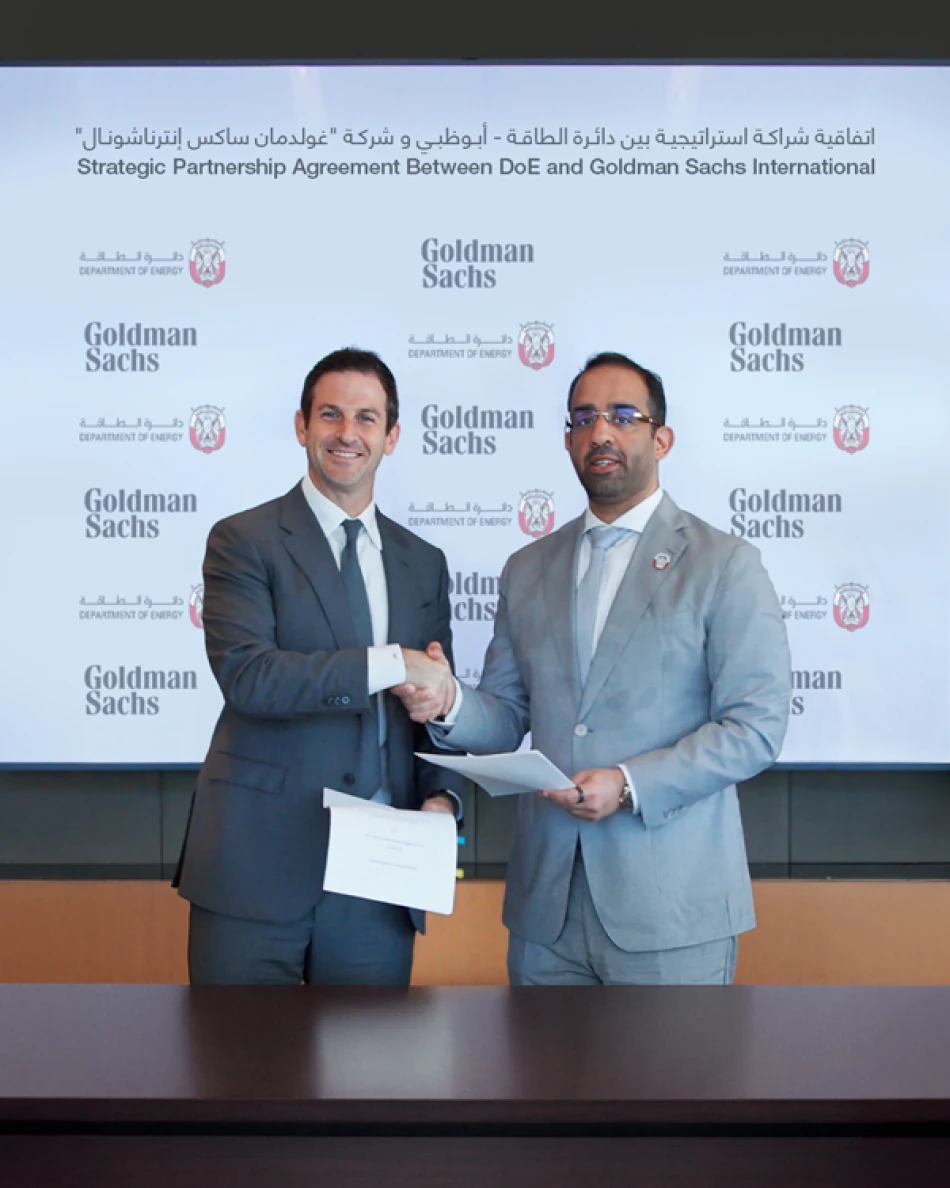
Abu Dhabi's Energy Company Partners with Goldman Sachs to Develop Water Sector
Abu Dhabi Strikes Goldman Sachs Water Deal as Gulf States Race to Secure Resource Independence
Abu Dhabi's Department of Energy has signed its first government partnership with Goldman Sachs International, targeting foreign investment and public-private collaboration to modernize the emirate's water infrastructure. The landmark agreement signals the UAE's strategic push to transform water security from a vulnerability into a competitive advantage, as Gulf states increasingly view resource independence as critical to long-term economic stability.
Goldman Sachs Partnership Opens New Funding Channels
The memorandum of understanding covers advanced water treatment technologies, network resilience enhancement, and asset monetization options that would allow private capital to finance critical infrastructure projects. This marks a significant shift from traditional government-funded utility development toward market-driven solutions.
The deal emerged from a high-level delegation visit to five US states—California, Texas, Michigan, Massachusetts, and New York—where Abu Dhabi officials met with government representatives, research institutions, technology companies, and investment centers. The timing reflects growing urgency around water security as climate pressures intensify across the Middle East.
Digital Platform Integration Attracts International Interest
Central to the discussions was Abu Dhabi's AD.WE digital platform, developed with partners AIQ and Presight. The AI-powered system uses predictive analytics for resource management, positioning Abu Dhabi as a testbed for next-generation utility technologies that could be exported globally.
This technological showcase strategy mirrors Singapore's approach to water innovation, where the city-state leveraged its resource constraints to become a global hub for water technology companies and expertise.
Market Implications and Investment Scale
Dr. Abdullah Hamid Al-Jarwan, Chairman of Abu Dhabi's Department of Energy, emphasized that water security forms a core component of the emirate's energy transformation agenda. The Goldman Sachs partnership reflects Abu Dhabi's commitment to attracting expertise and investments that ensure resilient, efficient, and future-ready water systems.
The agreement aligns with Abu Dhabi's strategic framework targeting AED 400 billion in foreign investment across energy and water sectors by 2050. This ambitious figure suggests Abu Dhabi views infrastructure modernization not just as necessary spending, but as a foundation for economic diversification beyond oil revenues.
Regional Competition Intensifies
The move positions Abu Dhabi ahead of regional competitors in attracting international financial partnerships for infrastructure development. While Saudi Arabia's NEOM project captures headlines with futuristic city plans, Abu Dhabi's approach focuses on upgrading existing systems with proven financial partners—a potentially more executable strategy.
Technology Focus Areas Signal Future Priorities
The partnership will target network loss reduction, expansion of clean energy-powered desalination technologies, and consumption efficiency programs. These focus areas reflect lessons learned from water-stressed regions like Australia and Israel, where technological innovation drove dramatic efficiency improvements.
Joint working groups will launch pilot projects in artificial intelligence, energy storage, and water consumption efficiency. The emphasis on AI integration suggests Abu Dhabi recognizes that future water security depends as much on intelligent management as on raw infrastructure capacity.
Strategic Positioning for Climate Resilience
The initiative supports the UAE's National Water Security Strategy 2036 and Abu Dhabi's Integrated Water Resources Management framework. By partnering with Goldman Sachs, Abu Dhabi gains access to global capital markets and financial engineering expertise that could make large-scale infrastructure projects more viable.
This financial partnership model could become a template for other Gulf states facing similar resource challenges. As climate pressures mount and traditional energy revenues face long-term uncertainty, the ability to attract private capital for essential infrastructure becomes a critical competitive advantage.
The success of this partnership will likely influence whether other international financial institutions view Middle Eastern infrastructure as an attractive investment opportunity, potentially reshaping how the region funds its transition to post-oil economies.
Most Viewed News

 Layla Al Mansoori
Layla Al Mansoori






